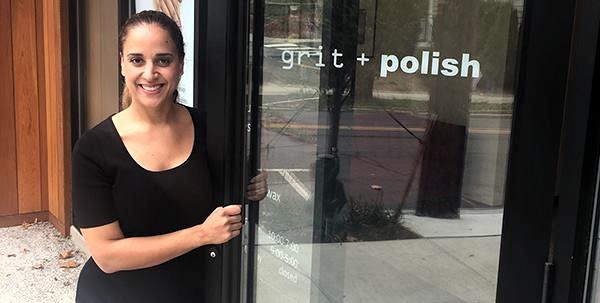By Pam Hersh
My daily walks, generally stress relieving, have become stress inducing, as I walk the streets of downtown Princeton and pass an increasing number of down-and-permanently-out, instead of up-and-coming, retail stores.
“It will take a lot of grit” to survive the treacherous COVID climate, said another walker, who observed me looking longingly in the windows at the big empty retail space on Hulfish Street, the former residence of Kitchen Kapers, a recent COVID climate casualty.
The term “grit” made me think of a store in my neighborhood that I walk past daily and whose name epitomizes grit – Grit + Polish on Witherspoon Street. I decided I had to find out how a “premium beauty services” (nails, facials, waxing) salon – providing particularly up close and personal services – had the grit to weather the COVID storm.
Before the salon reopened on June 23, its founder and owner Jacqueline Fay wasn’t just sitting around the house and polishing and re-polishing her nails. She was searching for ways to keep Grit+Polish relevant. The first thing she did after closing down in March was to donate personal protective equipment (PPE) to health care workers and first responders. She emptied the inventory room of 1,000 gloves, lots of cloth masks, swabs, disinfectant, etc. and hoped to inspire others to do the same.
Then, she started to implement marketing strategies regarding the products she sold in her salon. One of the Facebook posts read: Support Princeton’s Grit + Polish salon while pampering yourself with FarmHouse Fresh, our favorite product partner. Spend $30+, use promo code GRITANDPOLISH, and select a $15 hand cream — you get the cream free, and G+P will get a commission. www.farmhousefreshgoods.com/
But the true test of grit came when it came time to reopen. Jackie, who became an entrepreneur after a successful career as a benefits specialist for pharmaceutical companies, already had developed a reputation for grittiness just from the fact that she had the guts to create a salon based on a radically different business model.
She was determined to upend the stereotypical image associated with nail salons – as business ventures that severely exploited a mostly immigrant, often undocumented, female workforce. New York Times investigative reporting in 2015 and 2016 exposed the appalling abuses in working conditions, pay and benefits in the nail salon business – something that Jackie personally intuited through her conversations with Spanish-speaking salon workers, as well as through her business observations on how the very low prices for the services created an unsustainable business model – unless the employees were dramatically underpaid.
https://www.nytimes.com/2015/05/10/nyregion/at-nail-salons-in-nyc-manicurists-are-underpaid-and-unprotected.html
https://www.nytimes.com/2015/05/11/nyregion/nail-salon-workers-in-nyc-face-hazardous-chemicals.html
https://www.nytimes.com/2016/03/01/nyregion/nail-salon-sweeps-in-new-york-reveal-abuses-and-regulatory-challenges.html
Four years ago in 2016, Jackie opened her salon that provided the highest quality service by fairly compensated and fully licensed employees with legal immigration status. All employees received on-the-books pay and benefits, and worked in a state-of-the-art healthy environment, featuring the best air flow and filtration system and impeccable sanitation. She was keenly aware that to operate this business model she would have to charge more for her salon services than what was being charged at many salons throughout the area. But Jackie maintained faith in the integrity of the public and confident that she would prevail, because people would appreciate the quality and ethical underpinnings of the service she was providing . She became an active and influential member of the Princeton business community and the multi-ethnic Witherspoon-Jackson neighborhood.
And then COVID moved into the community and closed the store on Friday, March 13.
The good news about operating such a high-quality salon was that many of the COVID mandates for cleanliness and airflow were already being implemented. Furthermore, her workforce, comprising documented employees receiving on-the-books payments, qualified for unemployment benefits that enabled them to pay bills and weather the effects of the shutdown.
The bad news, of course, was that the salon could not operate at full capacity. The higher-revenue producing services, such as waxing and facials, were suspended. Appointments are required for everyone (i.e., no more walk-ins) to be made at least two hours in advance. Clients are screened for COVID symptoms when the appointment is made and on the appointment day. Social distancing and mask wearing are strictly enforced within the store, and Plexiglas dividers separate all various function areas of the salon.
“Although a lot of my clients are very happy we are open, others are nervous about coming to the salon. All I can say is what I said about opening the salon in the first place. I have to do this in the safest and most caring manner for both my employees and clients. I have to do it right – if I can’t, it is not worth it,” Jackie said.
Jackie refused to speculate on the future of what’s in store for her business. Perhaps she was channeling Colonel Stonehill in “True Grit”: “I do not entertain hypotheticals. The world itself is vexing enough.”

